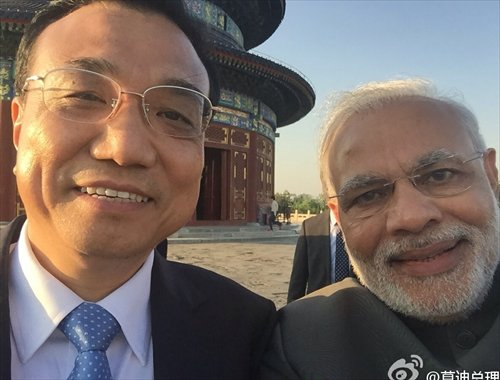Personal touch as Li, Modi sign deal
Agreements reached on aerospace, railways and tourism

Selfie by Modi (right) with Li posted online has been forwarded over 38,000 times. Photo: Sina Weibo

India's Prime Minister Narendra Modi and Chinese Premier Li Keqiang watch a tai chi and yoga event during a visit to the Temple of Heaven park in Beijing Friday. Photo: AFP
China and India have signed 24 deals in fields ranging from railways and aerospace to marine science on Friday, the second day of Indian Prime Minister Narendra Modi's three-day visit in China, as he met Chinese Premier Li Keqiang. The two countries also signed a joint statement, proposing measures to solve border disputes.
Modi's trip has boosted the political trust between the two countries, laying a concrete and practical framework for the bilateral ties in the next five to 10 years, observers said.
"We just had in-depth talks and touched on a wide range of topics, which we both expect to yield common ground and results. It is fair to say that we met expectations," Li said after the talks with Modi at the Great Hall of the People in Beijing.
Modi said his talk with Li will take Sino-Indian relations in a positive direction and the cooperation will not only benefit China and India but also sends a positive signal to the world, Xinhua reported.
He added that India views China as one of its most important strategic partners, because the revival of the two nations and the development of bilateral relations will have a significant impact on both the two countries and the world.
Friday's joint statement provided guidelines for political talks, border issues, economic and trade cooperation, cultural communication and other areas like climate changes and religious exchanges.
As for solving the border issue, the statement said that annual visits between militaries will start and border commanders will exchange with each other on a regular basis and the locations of meetings will be specified. A military hotline, which has been discussed for years, will be introduced.
"The joint statement offered practical measures that could be applied soon and will greatly reduce the chance of confrontation," said Liu Zongyi, a research fellow of Indian studies with the Shanghai Institute for International Studies.
Both sides agree that solving the border dispute is in line with two countries' interests and the dispute will not be an obstacle to bilateral ties. Before it is solved, the two sides will keep maintaining the peace and tranquility of the border area, the statement reads.
"The two sides should make full use of their wisdom to deal with sensitive issues such as the border issue, maintain the negotiation momentum, and establish cooperation framework mechanism," Li said.
While ensuring the peace and tranquility of the border, Li said the focus should be put on advancing bilateral strategic cooperation and common development, so as to realize a real "Asian Century."
Economically, China and India should connect their development strategies and draw strength from each other, he said. The bilateral trade volume has grown from $4.95 billion in 2002 to about $70 billion in 2014.
Manoranjan Mohanty, former chairperson of the Delhi-based Institute of Chinese Studies, said that one of Modi's chief objectives is to enhance economic ties and lower the rising trade deficit with China.
In fact, China is increasing its imports from India and it has pledged to increase its investment in Indian industrial and infrastructure projects to $20 billion in five years, according to Xinhua.
The deals signed include an action plan on deepening cooperation between China's National Railway Administration and India's Ministry of Railways and a five-year outline for cooperation in aerospace.
Other agreements include strengthening exchanges in media, think tanks, education and tourism.
Liu added that although the Belt and Road initiatives were not mentioned in the joint statement, the two countries agreed to speed up the development of the Asian Infrastructure Investment Bank.
"As well as expanded cooperation between two countries, the people-to-people exchange progress is also important for bilateral ties," Ye Hailin, secretary-general at the Center for South Asian Studies of Chinese Academy of Social Sciences, told the Global Times.
Unlike other diplomatic occasions when the communication only stays at the leadership level and touches more about economic and political topics, Modi's visit has been blended with interactions between netizens and traditional cultural elements.
"The mutual trust has been enhanced through a very personal approach," Ye said, adding the close people ties will lay good foundation for closer ties.
Modi said he was honored that the Chinese president gave him a warm welcome in Xi'an, the capital city of Shaanxi Province and Xi's hometown.
This is the first time Xi has welcomed a foreign leader to his hometown. "Xi's welcome also touched the hearts of 1.25 billion Indian people," Modi said. Modi also took a selfie with Li at the Temple of Heaven park in Beijing on Friday and posted on Sina Weibo and it soon became a hit.
The two countries have decided to set up consulates in China's Chengdu and India's Chennai. Modi also announced, after giving a speech in Tsinghua University at Friday afternoon, that Chinese tourists could apply for e-visas to India.
Xinhua contributed to this story
Read more in Special Coverage: